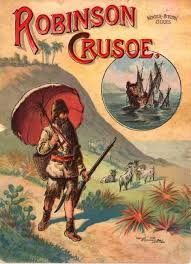Robinson Crusoe
by Daniel Defoe
1719
Robinson Crusoe – or, as its amazing sub-title would have it ‘The Life and Strange Surprizing Adventures of Robinson Crusoe, Of York, Mariner: Who lived Eight and Twenty Years, all alone in an un-inhabited Island on the Coast of America, near the Mouth of the Great River of Oroonoque; Having been cast on Shore by Shipwreck, wherein all the Men perished but himself. With An Account how he was at last as strangely deliver’d by Pyrates’ is quite an extraordinary book. Published in 1719 at the very dawn of the novel, it was widely taken as a true story. It was wildly popular, running through four editions in its first year of publication, and according to Wikipedia, by the end of the 19th century no book in the history of Western literature had more editions, spin-offs and translations (even into languages such as Inuktitut, Coptic and Maltese), with more than 700 such alternative versions.
Taking the novel as an adventure story for a minute and ignoring its importance as a cultural artefact, this was fun. After running away to sea, being enslaved and then escaping, Crusoe finally makes his way to Brazil, where he settles down and becomes prosperous. Greed tempts him into a voyage, where he is shipwrecked on the aforementioned deserted island. What isn’t well known is that his voyage was to purchase slaves to work on his plantation. The attitude to slavery is interestingly frank – slavery isn’t particularly nice for the slaves, Crusoe recognises – he knows even the cannibals he meets on ‘his’ island are still people – but then Christmas isn’t nice for turkeys. It’s just a fact of the world he lives in, and the thought of doing something about it doesn’t cross his mind, in the same way as we see suffering and misery in our own world and shrug and walk on by.
‘Crusoe‘ can really only be read as a story of imperialism or colonialism. He goes about mastering his environment with a dogged determination, farming, building and learning skills such as pottery and basket weaving. The animals on the island are culled in a casual a way that helps the reader understand how 17th and 18th century sailors destroyed native populations of animals such as the dodo so wantonly. He slowly comes to a religious settlement with his situation, accepting that while God may have shipwrecked him alone on the island for decades, he also provided him with an Eden-like environment in which surviving is not a struggle.
“These reflections made me very sensible of the goodness of Providence to me, and very thankful for my present condition, with all its hardships and misfortunes ; and this part also I cannot but recommend to the reflection of those who are apt, in their misery, to say, Is any affliction like mine? Let them consider how much worse the cases of some people are, and their case might have been, if Providence had thought fit.”
Provisioned from the wreck of his ship with virtually every tool, seed, animal and material he could possibly need, he is able to construct a home, a farmstead, and a fortification against dangerous creatures (of which there are none) and savages, which only appear towards the end of the novel. This is inspired by the famous and mysterious ‘footprint on the sand’ scene, mysterious because Defoe stresses several times that there is only the one footprint. Where it comes from is never resolved, but leads Crusoe to discover the cannibals that periodically visit the other side of his island for their celebration feasts. He interrupts one such party to rescue his man Friday, who becomes a faithful friend. He teaches Friday all about Christianity. This generates one wonderful scene where Friday innocently asks Crusoe some difficult theological questions (specifically, If God is all powerful, why is his struggle with the Devil so protracted?) which lead to a bit of a tumbleweed moment – Crusoe has to evade the question by pretending not to hear it!
Having been quite slow paced while Crusoe explores his world and steadily turns it into a little England, the narrative accelerates when the cannibals arrive, swiftly followed by an English ship captured by mutineers and recaptured by Crusoe, on which he returns to England to reclaim his birthright and possessions. There is time for one last chase through the woods pursued by packs of wolves, before Defoe decides to let Crusoe rest and take a breather.
The impact of Defoe on the English novel was huge. Poe obviously borrows heavily from him in ‘The Narrative of Arthur Gordon Pym of Nantucket’, as do the later Victorian adventure novelists such as Verne and Wells. You can even see traces of Crusoe in ‘Coral Island‘, and its counterpart ‘Lord of the Flies‘. This is the earliest novel I have reviewed to date, and its surprising modernity – there was no difficulty in language or style – is a tribute to Defoe’s innovation.
THE READING BUG



No comments:
Post a Comment